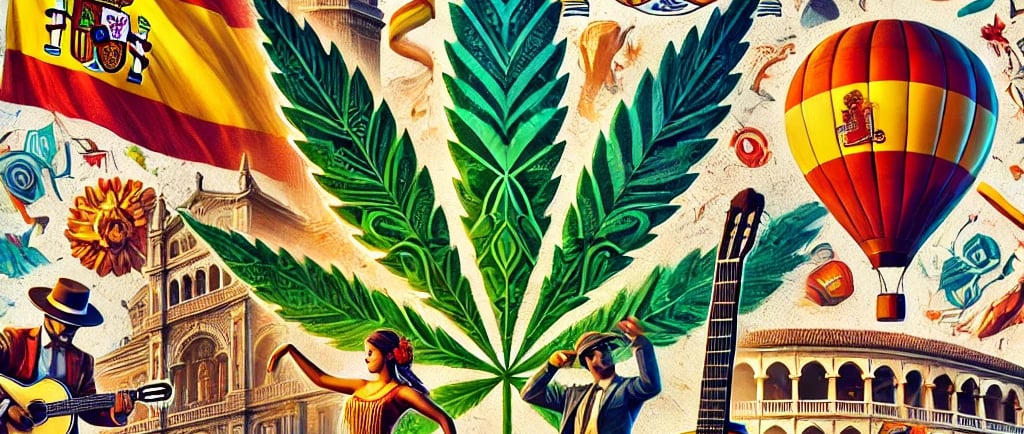Cannabis and Cultural Integration in Spain: Blending Tradition with Modernity in 2024
Cannabis is becoming an increasingly prominent part of Spanish culture, blending seamlessly with the country’s long-standing traditions and modern lifestyle. As societal attitudes continue to evolve, cannabis is finding its place not only in the private lives of individuals but also in public celebrations, art, and social movements. This article explores how cannabis is being integrated into Spanish culture in 2024, highlighting the influence of cannabis social clubs, its presence in festivals and events, and its role in art and social movements.
CANNABIS GUIDE
9/6/20244 min read


1. Cannabis Social Clubs: Hubs of Cultural Integration
Cannabis social clubs are at the heart of the cannabis culture in Spain. These clubs provide a private space for members to consume cannabis, but their role extends far beyond just a place to smoke. Cannabis social clubs are community hubs where people come together to socialize, share experiences, and engage in cultural activities. They are an integral part of Spain’s cannabis landscape and play a significant role in normalizing cannabis use within society.
The atmosphere in these clubs is often relaxed and inclusive, fostering a sense of community among members. Many clubs host events such as live music performances, art exhibitions, and educational workshops, offering members a diverse range of cultural experiences. These activities not only promote cannabis culture but also contribute to the broader cultural scene in Spain, attracting artists, musicians, and creators.
By providing a space for cultural exchange and community engagement, cannabis social clubs help to break down the stigma associated with cannabis use. They demonstrate that cannabis can be enjoyed responsibly and can be a part of everyday life, contributing to the social and cultural fabric of the community.
2. Cannabis at Festivals and Public Events
Spain is known for its vibrant festivals and public events, many of which attract visitors from around the world. From the fiery Las Fallas in Valencia to the colorful Carnaval in Sitges, these festivals are a celebration of Spain’s rich cultural heritage. In recent years, cannabis has become increasingly visible at these events, reflecting its growing acceptance in Spanish society.
While cannabis use at festivals is generally unofficial and often occurs discreetly, it has become a common sight, especially among younger generations. The relaxed approach to cannabis use during these events mirrors the broader societal attitude in Spain, where personal cannabis consumption is widely accepted in private settings.
In addition to mainstream festivals, Spain hosts cannabis-specific events that celebrate cannabis culture. Spannabis, held annually in Barcelona, is one of the largest cannabis fairs in Europe, attracting thousands of visitors. The event features exhibitions, workshops, and discussions about cannabis, providing a platform for enthusiasts, industry professionals, and the public to come together. These events highlight the role of cannabis as a cultural and social force, bringing people together to celebrate their shared interests.
3. Cannabis in Art and Popular Culture
Cannabis has long been a source of inspiration for artists and creators, and this is evident in Spain’s vibrant art scene. From street art and murals to music and film, cannabis is making its mark on Spanish popular culture. Artists use cannabis as a theme to explore issues such as freedom, creativity, and social justice, reflecting the plant’s role as a symbol of counterculture and alternative lifestyles.
Music is one area where cannabis has a significant presence. Genres such as reggae, hip-hop, and electronic music, which are popular in Spain, often incorporate cannabis-related themes into their lyrics and imagery. Festivals and concerts provide a space for fans to enjoy music while celebrating cannabis culture, creating an atmosphere of camaraderie and shared experience.
Cannabis is also becoming more visible in Spanish cinema and television. Films and series that feature cannabis use as part of their storyline contribute to normalizing the plant in popular culture. These representations often portray cannabis in a positive light, emphasizing its role in relaxation, creativity, and social bonding.
4. Cannabis and Social Movements
Cannabis has a long history of association with social movements, and this is no different in Spain. The push for cannabis legalization and normalization is part of a broader movement advocating for social justice, personal freedom, and human rights. Activists argue that cannabis prohibition is outdated and counterproductive, calling for reforms that recognize the plant’s potential benefits and respect individual autonomy.
Cannabis activism in Spain is closely linked with other progressive causes, such as environmental sustainability, LGBTQ+ rights, and gender equality. Many cannabis advocates emphasize the plant’s natural and sustainable properties, positioning it as an alternative to harmful industrial practices. This alignment with environmentalism is particularly strong in Spain, where the Mediterranean climate and agricultural tradition make sustainable cannabis cultivation a viable and attractive option.
Organizations such as the Spanish Cannabis Federation (Federación de Asociaciones Cannábicas, FAC) play a key role in advocating for cannabis rights, organizing protests, campaigns, and educational initiatives. These efforts aim to shift public opinion, influence policy, and ensure that cannabis users are treated fairly and without discrimination.
5. Cannabis and Wellness: A Growing Trend
The use of cannabis for wellness and self-care is a growing trend in Spain, reflecting the plant’s integration into modern lifestyles. Many Spaniards are turning to cannabis as a natural remedy for relaxation, stress relief, and overall well-being. Products such as CBD oils, creams, and edibles are gaining popularity, catering to those who seek the therapeutic benefits of cannabis without the psychoactive effects.
Wellness practices that incorporate cannabis, such as yoga and meditation, are also becoming more common. Cannabis-friendly wellness retreats and events offer participants the opportunity to connect with nature, explore mindfulness practices, and learn about the benefits of cannabis for body and mind. These experiences reflect a holistic approach to health and wellness, where cannabis is seen as a tool for enhancing quality of life.
The integration of cannabis into wellness aligns with the broader cultural trend towards natural and holistic health practices. As more people seek alternatives to conventional medicine and embrace plant-based solutions, cannabis is finding its place as a valuable component of modern wellness routines.
6. The Future of Cannabis in Spanish Culture
As cannabis continues to gain acceptance in Spain, its integration into the cultural landscape is likely to deepen. The growing presence of cannabis in social clubs, festivals, art, and wellness reflects a broader shift towards normalization and acceptance. This trend is expected to continue, driven by changing social attitudes, advocacy efforts, and the ongoing debate around legalization.
Looking ahead, cannabis could become an even more prominent part of Spanish culture, influencing everything from culinary traditions to fashion. As the stigma around cannabis fades, more people will feel comfortable incorporating it into their daily lives, whether for recreation, wellness, or creative expression. This cultural shift will not only benefit cannabis users but also contribute to a more open, inclusive, and progressive society.
Conclusion
Cannabis is increasingly becoming a part of Spanish culture, blending seamlessly with both tradition and modernity. From social clubs and festivals to art and wellness, cannabis is making its mark, reflecting its growing acceptance and cultural significance. As Spain continues to embrace cannabis, the plant will play an even greater role in shaping the country’s social and cultural identity, offering new opportunities for connection, creativity, and well-being.
By embracing the cultural integration of cannabis, Spain can set an example for other countries, demonstrating how cannabis can be enjoyed responsibly and positively contribute to society. The future of cannabis in Spain is bright, and its cultural journey is only just beginning.
